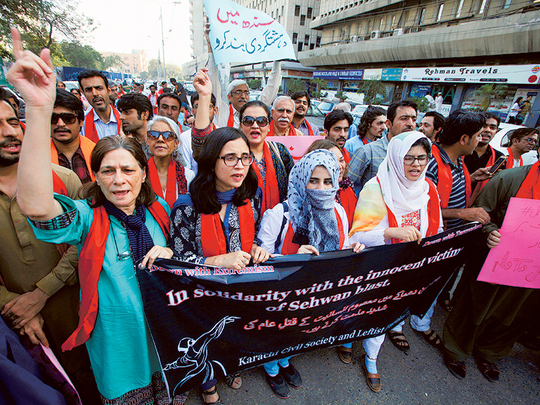
Islamabad: Pakistani authorities shut down a second key border crossing into Afghanistan, halting trade supplies to the neighbouring landlocked country and increasing tensions between the two nations in the wake of a bloody suicide bombing at a beloved shrine in Pakistan, officials said Saturday.
The border closure at Chaman in southwest Balochistan province came after an attack on a Sufi shrine in southern Pakistan on Thursday left 88 worshippers dead. The move was seen as an effort to pressure Kabul to take action against militants who Pakistan says have sanctuaries in Afghanistan.
Responsibility for the attack at Lal Shahbaz Qalander shrine in Sehwan was claimed by the Daesh group.
Pakistan security forces have launched nationwide operations that they say have left more than 100 “terrorists” dead.
Pakistan closed the border at Torkham hours after the bombing and the Chaman border was shut late Friday, said a senior army official.
A second official confirmed the details, saying trucks and shipping containers carrying trade supplies were parked miles away from the border crossings. Torkham connects Pakistan to Afghanistan’s Nangarhar province and Chaman is located near Spin Boldak in Kandahar.
The Pakistani officials asked to remain anonymous because they are not authorised to brief the media on the record.
The latest developments come amid media reports that Pakistani troops backed by artillery targeted camps belonging to Jamaat-ul-Ahrar, a breakaway faction of the Pakistani Taliban, near the Afghan border, causing an unspecified number of militant casualties.
Jamaat-ul-Ahrar has claimed to have carried out a number of attacks, including the February 13 suicide assault in Lahore that killed seven police officer and six civilians. Pakistan says Jamaat-ul-Ahrar and the main Tehrik-e-Taliban Pakistan militant groups had been operating from Afghan areas near the Pakistani border and that Kabul in the past ignored Islamabad’s pleas to take action against them.
Shahbaz Sharif, chief minister in the eastern Punjab province, announced late Friday the arrest of a suspect in connection with the February 13 suicide bombing. He played a video containing what he said was the man’s confession, in which the man says he was associated with Jamaat-ul-Ahrar and that he helped the bomber to carry out the attack.
Pakistan’s military said Friday it summoned Afghan diplomats and handed over a list of 76 suspected “terrorists” who were hiding in Afghanistan. Pakistan wants immediate action by Afghan authorities, including the suspects’ extradition to Islamabad.
In Kabul, the Afghan government Saturday summoned Pakistan’s ambassador in protest of recent shelling in Afghanistan’s eastern provinces. The foreign ministry summoned Ambassador Abrar Hussain in Kabul, where Deputy Foreign Minister Hekmat Khalil Karzai sought an explanation from Hussain, but also gave his condolences regarding recent suicide attacks in Pakistan.
At least two people have been killed and two others wounded in the shelling from Pakistan, according to reports.
Karzai said the Afghan government wants Pakistan to take strict action against terrorists that are hiding in Pakistan.
He expressed concern over the closure of the Torkham and Chaman border crossings and asked that the gates be reopened. Apart from disrupting trade, the closure of border may also delay the repatriation of Afghan refugees by the refugee agency of the United Nations.
These refugees have been living in Pakistan since the 1980s after the Soviet Union invaded Afghanistan. Pakistani officials say the country sheltered 5 million Afghan refugees at one time and there are still an estimated 1.3 million registered and over a million more unregistered living in the country. Pakistan has allowed registered refugees to remain in the country until the end of this year.
Also on Saturday, Afghan army chief of staff Gen. Qadam Shah Shahim, said his forces killed 1,955 Daesh group fighters over the past year.
He told reporters in Kabul that he regretted that Pakistan attacked eastern Afghanistan with artillery fire and said “we have shared our concerns through diplomatic channels with Pakistani authorities. We are waiting for the response through the diplomatic channels” otherwise we are fully ready to defend our country.”
To a question about the list of 76 “terrorists” given by Islamabad to Kabul, Shahim said they too gave such a list of terrorists to Pakistan in the past and hoped Pakistan will act against them because they were using Pakistani soil to launch attacks in his country.












